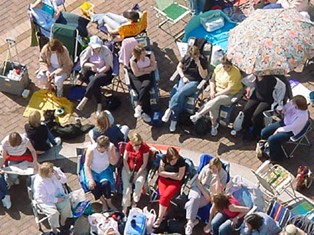Find out more about The Open University's Social Sciences courses
This article belongs to the Women and Workplace Struggles: Scotland 1900-2022 collection.

Setting the scene
When we think about things like militancy, trade unionism, struggle and fightback, we draw on familiar imagery of braziers at shipyard gates and pitheads. We think of charged mass meetings, packed full of angry and determined … well, men. It is perhaps hard for us to contemplate, then, that early in the first decade of the twenty-first century, a two-and-a-half-year dispute over pay, conditions and national bargaining rights involving women was transformed into a nationwide, profession-wide struggle that culminated in an all-out strike that lasted for around three months. Even harder for us to grasp, maybe, is that this was a strike by public sector nursery nurses – a group not traditionally known for militancy. The strike was as inspiring as it is surprising and yet, like so many of their ‘sister-workers’ in both the public and private sectors, their story is largely ‘hidden from history’. Although there is no memorial, no yearly commemoration and, importantly, no real recognition, not only of their determination and struggle but also of how, as a result, our understanding of early years’ education was transformed in public consciousness and in reality.
This short piece, based partly on research conducted during the strike in 2004 (see Mooney and McCafferty, 2005 and 2007), is my attempt to address this to an extent, and to ensure Scotland’s nursery nurses are given their rightful place in our awareness and understanding of women’s workplace struggles in the twenty-first century and their impact.
Background to the strike
Despite their ongoing commitment and their very real concerns about what this might mean for service provision, in February 2004, in a ballot of almost 5,000 Unison members across Scotland, council employed nursery nurses voted by 81 per cent to 19 per cent for indefinite strike action (UNISON Scotland, 2014). And so began the largest all-out indefinite strike in Scotland since the Miners’ Strike of 1984–85, across all thirty-two local authorities. In deciding ‘enough was enough’, Scotland’s nursery nurses took on their own employers, local government employer body COSLA and the devolved, Labour-led Scottish government in its relative infancy.
https://www.theguardian.com/society/2004/feb/17/industrialaction.uknews
As their dispute progressed (it originated in 2001–2) these, mostly women, workers came to view management’s position as fundamentally a concerted ‘divide and conquer’ attack by local government employers to attempt to broker local deals and, as a result, cap the already meagre wages of the majority of nursey nurses (at the time starting at £10,000 per year rising to £13,800, The Guardian 2004). What was also writ large was the undermining and undervaluing of the crucial role that these workers played every day in the development of tens of thousands of children. And the workers were not having it.
https://socialistworker.co.uk/news/all-workers-should-back-this-strike/
“Only looking after the weans”
At the heart of the dispute then was the nursery nurses’ demand for a significant improvement in pay and conditions, including a new career structure to replace a regime that had been introduced in 1988 and which had operated unaltered since. The reasons for the strike were, on the one hand, simple. The nursery nurses had not had a pay increase for 15 years (UNISON Scotland, 2004). On the other hand, and perhaps more importantly, they were arguing for recognition of their enhanced role in the provision of ‘early years’ education where they were the key workers (see Mooney and McCafferty, 2007). As one nursery nurse put it: “we don’t just change nappies, we change lives” (quoted in Mooney and McCafferty, 2005). Clearly their pay and conditions were increasingly out of step with this
In the context of the 2020–2022 COVID-19 pandemic, we are all too familiar with the critical role of key workers and all too aware of the undervaluing and underpaying of such workers. This was and, in essence, continues to be the long-term struggle against the suppression of women’s earning because of their concentration into a relatively narrow range of occupations and, in the case of the nursery nurses, one they were ‘born to’ as far as social norms dictated. Again, the women were not having it. The ‘popular’ idea that people thought they were “only looking after the weans”, as another nursery nurse said, was challenged every day of the strike. And this is crucial in terms of uncovering the realities of women’s struggles. Yes, this was a strike about pay and conditions and therefore firmly in the tradition of so many militant struggles before. But it also represented a challenge to how we see ‘women’s work’ and, in particular, to initiate a shift in our understanding of the impact of the key workers of early years’ education.
‘A special kinda strike’
 That the strike played an important role in changing views
about who was fundamentally delivering early years education and child
development ‘on the frontline’ makes it special. Scottish Government plans to
professionalise the job needed to be paid for and its workers recognised.
Scotland’s nursery nurses forced this onto the agenda. However, the strike is
special for another reason: its creativity. The very skills these workers used
on a day-to-day basis were deployed to full effect and became a defining
characteristic of the strike. This was a strike that was colourful, vibrant and
full of jagged humour. Strike days and picket lines were often themed - beach
day was a particular favourite.
That the strike played an important role in changing views
about who was fundamentally delivering early years education and child
development ‘on the frontline’ makes it special. Scottish Government plans to
professionalise the job needed to be paid for and its workers recognised.
Scotland’s nursery nurses forced this onto the agenda. However, the strike is
special for another reason: its creativity. The very skills these workers used
on a day-to-day basis were deployed to full effect and became a defining
characteristic of the strike. This was a strike that was colourful, vibrant and
full of jagged humour. Strike days and picket lines were often themed - beach
day was a particular favourite.
The words of well know nursery rhymes and songs were even changed
to reflect their frustration and their views on the role of the Government. Much
of this was directed at the then Scottish First Minister, Labour’s Jack
McConnell:
(To Humpty Dumpty)
Jack McConnell sat on the fence
said take your pay rise, less 19 pence
all of Jack's women & all of Jack's men
couldn't put Labour in parly again
(To Rod Stewart’s Maggie)
Wake up Jack I think we've got
something to say to you
It's 7 weeks and we really should be
back at school
I know we keep you amused but we feel
we're being used
Oh Jack we couldn't have tried anymore!
This struck a chord with the public, whose support in the face of the workers being pilloried by employers seeking to intimate with the usual tactic of ‘no deal until there’s a return to work’ meant so much.
Conclusion
Clearly this was a defiant strike. It was a lively and militant strike but it was not a traditional strike and these were not traditional strikers. I would suggest that this was a strike uniquely female, uniquely nursery nurses, uniquely newly found voices. And these voices shed light on the often-hidden story of the undervaluing of key work. Although, perhaps, not fully understood at the time, they also contributed in the most inspiring way to a critical social and political debate that we have become all too aware of. This, of course, is a debate which continues apace today. It is reflected in a question (asked disparagingly) overheard recently “when did nursery become ‘early years educators?” The answer is they always have been. But this strike was a key moment – perhaps the key moment in them being recognised as such.

Rate and Review
Rate this article
Review this article
Log into OpenLearn to leave reviews and join in the conversation.
Article reviews